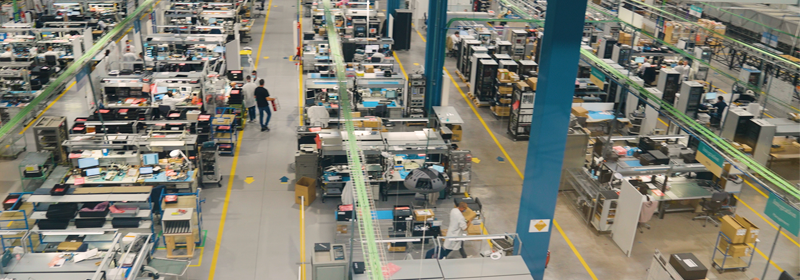- The company's four production centers in Madrid, belonging to the Operations division of the company's Transport and Defence business, have set specific environmental objectives, aligned with Indra's Sustainability Master Plan
- Because of their close relationship with the supply chain, and because they are the centers with the highest consumption and waste generation, achieving more sustainable operations improves Indra's environmental and social performance, and represents a competitive advantage in terms of quality and cost savings
- Indra has set itself the ambitious goals of reducing its energy consumption emissions by 50% by 2030, reaching zero emissions in this area by 2040, and extending decarbonization throughout its supply chain to become completely carbon neutral by 2050

Indra, one of the leading global technology and consulting companies, recognized as the world's most sustainable company in the technology sector by the Dow Jones Sustainability Index, continues to make progress on its path towards decarbonization and has managed to reduce energy consumption by 15% and non-hazardous waste generated in its main factories by 20% in just nine months.
Located in the Community of Madrid, specifically in the municipalities of San Fernando de Henares (Mar Egeo and Guarnicioneros), Torrejón de Ardoz, and Aranjuez, these factories are Indra's largest production centers and are part of the Operations division of the Transport and Defence (T&D) business. This is where Indra's simulators, radars, toll gantries, ticket vending machines, and access control systems, among many other items of equipment, are developed and produced, and subsequently exported all over the world.
To improve Indra's sustainability performance, the Operations division is fundamental, given that these factories are the work centers with the highest waste generation and energy consumption, although renewable energy already accounts for 89% of this consumption, and by 2023 it will be 100%. In addition, the Operations division maintains a close relationship with and manages a large part of Indra's supply chain, a key element in reducing carbon emissions and resource consumption.
For this reason, a specific plan has been designed for this area, fully aligned with Indra's Sustainability Master Plan, which defines the short and medium-term priorities, and the actions to be carried out to improve environmental and social performance.
On the one hand, it is taking advantage of a logistics efficiency project, Lean Logistics, in which lean methodologies are applied to minimize the resources used, both in the nine in-house warehouses and in the logistics operator, improving all aspects related to procurement, warehouse management, and material flows. For example, the warehouse network has been reorganized, optimizing space at the Aranjuez factory, and work continues on improving logistics systems, contributing to greater efficiency in transportation between these warehouses, which has already enabled a reduction of CO2 emissions by 0.85 tons and achieved annual savings of 90,000 euros.
Furthermore, traditional packaging, such as expanded polyurethane or single-use cardboard boxes, has been replaced by reusable and fully recyclable anti-static packaging. In order to improve the separation and recycling of materials, we also have improved the distribution in the waste collection areas and are carrying out awareness campaigns aimed at employees. In addition, a target has been set to increase the percentage of recovery (reuse and/or recycling) of the most polluting hazardous waste.
With regard to the social dimension, Indra is working with its partners and suppliers to include clauses on environmental, social and good governance (ESG) issues in its logistics and transportation framework contracts. In this field, the use of sustainable hybrid vehicles (Electric / LPG) with the ECO environmental label and the increase in range from 250 to 300 km/day, with the consequent reduction of dedicated transports, has enabled a 17% increase in shipment consolidation capacity and a 23.8% reduction in CO2 emissions derived from transport, compared to the use of conventional diesel vehicles.
For a large company like Indra that markets its products worldwide, achieving more sustainable operations is a competitive advantage, as it allows it to improve its ESG performance, differentiate its products and processes, and achieve higher quality and cost savings.
Reducing emissions to curb climate change
These achievements in Indra's main production plants mean progress in achieving the objectives set out in its Sustainability Master Plan in terms of improving the measurement and reduction of the carbon footprint and improved energy efficiency, managing waste in a more responsible way, according to the principles of the circular economy, and incorporating ESG criteria in the design and manufacture of its products and services.
In addition, they contribute to the emission reduction objectives with which Indra wants to join the fight against climate change. Indra has undertaken to reduce its Greenhouse Gas (GHG) emissions this year, in accordance with measurable and science-based targets, in order to contribute to restricting global warming to a maximum of 1.5 ºC and set itself the goal of reducing its net emissions to zero by 2050. This commitment is in keeping with the 2030 Agenda and the Paris Agreement, as well as the Science Based Target Initiative (SBTi), which Indra has joined.
Indra has set itself the ambitious goals of reducing its energy consumption emissions by 50% by 2030, reaching zero emissions in this area by 2040 and extending decarbonization throughout its supply chain to become completely carbon neutral by 2050. All these targets are global, which entails added complexity due to the fact that it has nearly 200 facilities in the 40-plus countries in which the company operates, nearly 50,000 employees and more than 7,000 suppliers.
Indra has already been working to reduce its emissions for some time. In fact, it has been included in the list of the 300 European companies that reduced greenhouse gas emissions most between 2014 and 2019, drawn up by the Financial Times and the research company Statista, in which Indra has been ranked as the number one Spanish technology company and number three in Europe in emissions reduction.